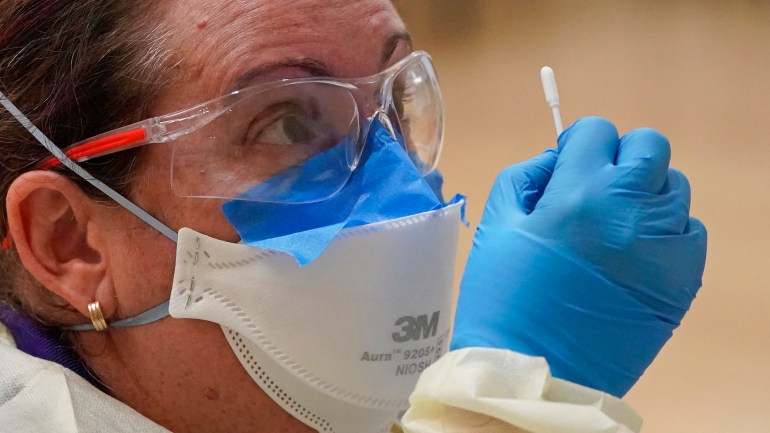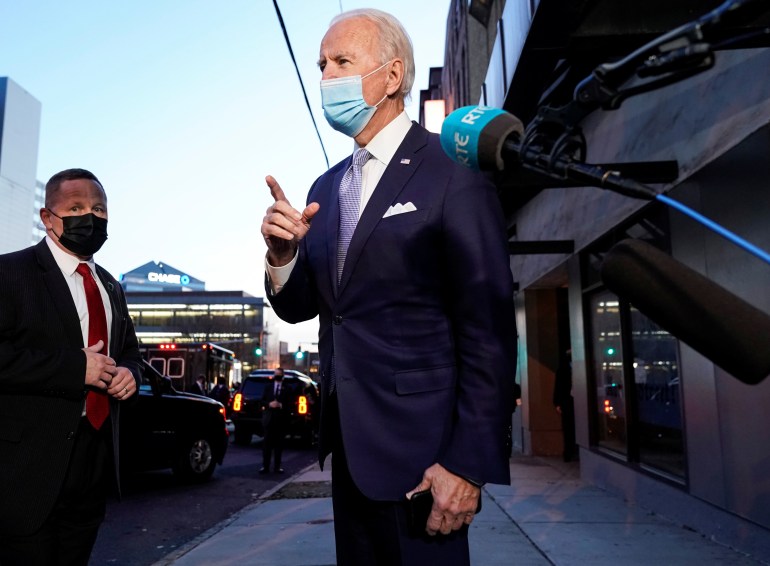US pins hope on vaccine amid November surge in COVID-19 cases
Coronavirus cases were more than double the previous monthly record set in October, straining hospitals and staff.

The United States entered the final month of the year hoping that promising vaccine candidates will soon be approved to halt the rapidly spreading novel coronavirus after 4.3 million new cases were reported in November.
The new COVID-19 cases were more than double the previous monthly record set in October, as large numbers of Americans still refuse to wear masks and continue to gather in holiday crowds, against the recommendation of experts.
Keep reading
list of 3 itemsControversial Trump COVID-19 pandemic adviser resigns
COVID-19 will increase humanitarian needs in 2021: UN
With outgoing President Donald Trump’s coronavirus strategy relying heavily on a vaccine, a panel of health experts advising the Centers for Disease Control and Prevention (CDC) is scheduled to hold a virtual meeting on Tuesday afternoon, in order to recommend who should receive the coronavirus vaccine first in the US.

The panel is expected to advise that healthcare workers as well as high-risk populations including the elderly and residents of assisted living facilities, be the first to receive the vaccine, The New York Times reported.
The meeting is expected to be followed by a Food and Drug Administration panel of outside advisers on December 10 to discuss whether to recommend the FDA authorise emergency use of a vaccine developed by Pfizer.
A second candidate from Moderna could follow a week later, officials have said, raising hopes that Americans could start receiving inoculations before the end the year, although widespread vaccinations could take months.
Other global pharmaceuticals including AstraZeneca and Johnson & Johnson also have vaccines in the works, leading a member of the Trump administration’s “Operation Warp Speed” programme to predict the country could be vaccinated by June.
“One hundred percent of the Americans that want the vaccine will have the vaccine by (June). We will have more than 300 million doses available to the American public well before then,” Paul Ostrowski, the vaccine program’s director of supply, production and distribution, told MSNBC television on Monday.
In the meantime, leading health officials are pleading with Americans to follow their recommendations and help arrest a pandemic that killed more than 36,900 people in November, according to a Johns Hopkins University tally, pushing hospitalisations to a record high.

‘The red flags are flying’
A study published on Monday based on samples collected by the Red Cross found that COVID-19 may have been circulating in the US in December 2019 – earlier than health experts first believed.
The study entitled Serologic testing of US blood donations to identify SARS-CoV-2-reactive antibodies: December 2019 to January 2020 tested 7,389 blood samples from nine US states between December 13, 2019, and January 17, 2020. Researchers found traces – or antibodies – of COVID-19 in 106 of the samples.
“The findings of this report suggest that SARS-CoV-2 infections may have been present in the US in December 2019, earlier than previously recognized,” the report found.
The first official case of the coronavirus in the US was identified on January 19, about a month after it surfaced in Wuhan, China.
But now with a surging number of people dying and more than one million contracting the virus last week, Trump has remained focused on overturning the results of the November 3 election which President-elect Joe Biden won, denying Trump a second term.

Biden has pledged to make combating the coronavirus his top priority upon taking office on January 20, saying he will rely on the best scientific evidence.
In the absence of a federal blueprint to curb the spread of the virus, states are issuing new or revamped restrictions on businesses and social life.
California’s governor said he may renew a stay-at-home order in the coming days, warning that ICU admissions are on track to exceed statewide capacity by mid-December unless public health policies and social behaviour change.
“The red flags are flying,” Governor Gavin Newsom told reporters in an online briefing. “If these trends continue, we’re going to have to take much more dramatic, arguably drastic, action.”